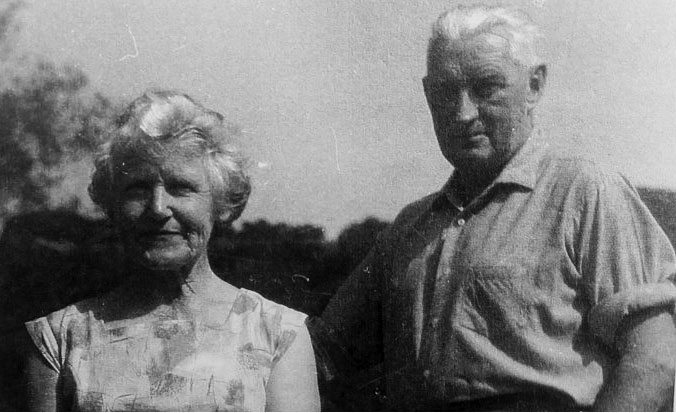Private James Alphonsis McBride

James McBride with his wife Mary in New Zealand
James Alphonsis McBride was born on 18 November 1895 at Greenan, Ballycastle, County Antrim, the eighth of nine children of farmer John McBride and his wife Mary Elizabeth (nee McLernon). By 1911 he was living at 1 Market Street, Ballymoney, with his parents and two of his sisters, his father working as a spirit merchant and farmer, while his two older brothers and a sister lived on the farm at Greenan. Soon after, his brother Frank emigrated to Perth, Australia.
McBride enlisted in the North Irish Horse on 25 May 1915 (No.1615). In 1916 or the first half of 1917 he embarked for France, where he was posted to one of the squadrons of the 1st or 2nd North Irish Horse Regiments (probably the latter).
In September 1917 the 2nd North Irish Horse Regiment was dismounted and most of its men were transferred to the 9th (Service) Battalion, Royal Irish Fusiliers – renamed the 9th (North Irish Horse) Battalion. They were joined by a number of surplus men from the 1st North Irish Horse Regiment. Private McBride was transferred to the battalion on 20 September. He was issued a new regimental number – 41214 – and posted to D Company.
He probably saw action with the battalion at the Battle of Cambrai in November and December 1917 and during the retreat from St Quentin from 21 to 28 March 1918.
On 9 April 1918 the 9th (NIH) Battalion was on the Ypres front when the Germans began an offensive in that sector. The battalion saw severe fighting between Wulverghem and Kemmel for more than a week and suffered many casualties. McBride was listed as missing following the action on 12 April on the Wulverghem-Messines road. The battalion diary for the day states:
Moved to near Wulverghem. H.Q. at N. Midland Farm. Enemy attacked, pressing back our line. Counter attack completely restored position. Casualties heavy, including M.O., Lieuts Hamilton, Hardy & Miller killed. Capt. Dean, Lts. Turner and Orr wounded.
In fact he had been captured, suffering from a wound to his right leg. He spent the remainder of the war as a prisoner, mainly at camps in Münster. He was repatriated after the Armistice, arriving at Hull on 2 December 1918.
After the war he emigrated to New Zealand with his wife Mary (pictured) and their first two children. He died at Urenui, North Taranaki, in 1965.
McBride's older brother Frank served in the war with the 11th Battalion, Australian Infantry Force. He was killed in France during a heavy artillery bombardment on 30 May 1916, and is buried at Rue-Petillon Military Cemetery, Fleurbaix. The Belfast News-Letter reported:
Mr. John McBride, Market Street, Ballymoney, has received intimation that his son, Private Frank McBride, Australian Contingent, has been killed in France. Private McBride, who was a fine type of manhood, standing well over six feet high, left Ballymoney for Australia some five years ago. Private McBride has a brother – Trooper James McBride – serving with the North Irish Horse.
Image of James and Mary McBride kindly provided by their great grand-daughter Colene McBride.
